Gaborone Travel Guide
Botswana's modern, vibrant capital, Gaberone, is one of the fastest growing cities in the world. While not big on tourist attractions, the destination is home to international hotels, souvenir shops, restaurants and other services that visitors will need before heading off on safari. There are a few sights and excursions to enjoy for those who only have a day or two in which to experience the country.
The pride and joy of Gaborone is its University and National Museum, which features some outstanding exhibits. One of the most striking buildings is Orapa House, where Botswana's diamonds are sorted and dispatched to markets around the world. The old part of the city, known as the 'Village', is where visitors will find remnants of Botswana's colonial history, such as the remains of the old Government Rest House, where the infamous Jameson Raid was believed to have been planned, and where Cecil John Rhodes sometimes stayed.
Things to do in Gaborone
Gaborone is perfect for wildlife enthusiasts who want to go on safari in one of Botswana's famed game parks. Located near Johannesburg, this sprawling city lies on the doorstep of the Mokolodi Nature Reserve, and offers game drives and walks. The city itself boasts some good shopping opportunities, so visitors can purchase mementoes to take home from their holiday.
There are also numerous cultural attractions in Gaborone, including the National Museum and Gallery, which give visitors insight into the local culture of the region. Alternatively, tourists can take a look at the impressive Hare Krishna Temple or spend some time in the Thapong Visual Arts Centre.
The best time to visit Gaborone is during spring or autumn (September, October or March, April and May), as summers can be blisteringly hot and, during winter, it can be very chilly at night.
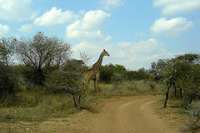
Mokolodi Nature Reserve
This 300-hectare reserve is just nine miles (15km) from Gaborone and contains examples of most of the local flora as well as an impressive collection of indigenous animals such as the white rhino, mountain reedbuck, various antelope, zebra, giraffe, hyena, and warthog. The reserve was created by a non-profit organisation for the purposes of conservation and education, and was established in 1994. It offers thatched self-catering chalets for those wishing to spend a night or two, and game drives and guided walks with experienced rangers.
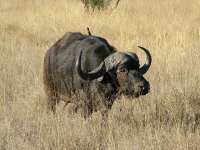
Gaborone Game Reserve
Although smaller than most, at just under 600 hectares, the Gaborone Game Reserve is the third busiest game reserve in Botswana, providing a very popular venue for city residents in which to unwind. As a popular escape for city dwellers, Gaborone Game Reserve has a vast array of facilities despite its smallish stature, such as picnic sites, a bird and game hide, and a network of game viewing roads. The park is home to rhino, ostriches, zebra, a variety of antelope and, like most game reserves in Botswana, is very popular with bird watchers. Conveniently located just outside Gaborone, the reserve can be an easy day trip for those who land in the capital.
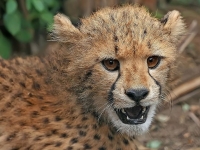
Khutse Game Reserve
Established in 1971, the Khutse Game Reserve encompasses 965 square miles (2,500 sq km) of semi-arid Kalahari bush savannah in the Bakwena tribal lands. Boreholes have been sunk into this undulating terrain to provide more water and encourage wildlife to stay in the area year-round. Visitors are now drawn to this undeveloped wilderness to see a wide range of herbivores including giraffe, gemsbok and wildebeest, as well as predators such as lion, leopard and cheetah, and birdlife ranging from wild ostriches to little browns. Visitors may only stay at marked campsites and there are no other tourist facilities available in the reserve.
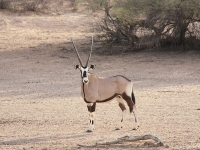
Kgalagadi Transfrontier Park
The Kgalagadi Transfrontier Park, located in both Botswana and South Africa, extends over 15,000 square miles (38,000 sq km) of the southern Kalahari Desert. About three quarters of the park lies in the extreme southwest of Botswana, locally known as the Gemsbok National Park. Visitors to the park can witness the fragile balance between migratory animals and their predators in this harsh, semi-arid environment: a real African safari experience. There are campsites available for visitors but other tourist facilities are very limited.
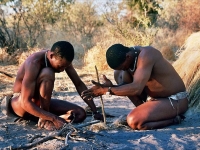
Central Kalahari Game Reserve
At 20,380 square miles (52,800 sq. km), the Central Kalahari Game Reserve is larger than some European countries, such as Denmark or Switzerland, and is bigger than Lesotho and Eswatini put together. Indeed, the reserve is the second largest on earth and its sand dunes, saltpans, riverbeds, mopane forests and vast open plains are home to an array of fascinating wildlife species, as well as settlements of local Basarwa or San tribes. It offers an exciting combination of both environmental and cultural experiences for visitors.
Getting Around
Public transport within Gaborone is somewhat limited. Licensed taxis are identified by their number plates, which have a blue background. These are usually shared and carry up to five passengers. Minibus taxis are also available and usually travel a specific route, and pass through the station or mall. These are easily hailed and passengers usually tell the driver to stop when they want to get off. Taxi apps Taksi and Call Kolloi operate in the city, and there are train services between Gaborone and Francistown, and Gaborone and Lobatse. Four-wheel drive vehicles are a popular choice for exploring areas outside of the city and Gaborone has several reputable car rental agencies. Gaborone's roads are tarred and usually in good condition, but drivers have to be on the look out for stray animals.
Gaborone Climate and Weather
The climate of Gaborone is semi-arid, meaning it is hot and dry for most of the year. There is little distinction between average summer and winter temperatures, although in winter it can be chilly at night. Rain is erratic, but falls mostly in summer in heavy localised downpours that are followed quickly by a return of strong sunshine. Summers are extremely hot with high humidity in the mornings. The best time to visit Gaborone is during spring or autumn when the weather is warm and dry.
Botswana travel info
Electricity
230 volts, 50Hz. Round three-pin plugs are used.
Language
English is the official language but Setswana is the most widely spoken language.
Money
The unit of currency is the Botswana Pula (BWP), which is divided into 100 Thebe. Major credit cards are widely accepted, and foreign currency is accepted at most large hotels and lodges. There are banks and bureaux de change in all the main towns, as well as ATM machines. Most ATMs only accept Visa.
Tipping
Tipping is expected in tourist hotels and restaurants. Many automatically add a service charge, but where not, a 10 to 15 percent tip is appreciated. Taxi drivers, porters and golf caddies should also be tipped a relative amount. Tour guides, trackers and game rangers rely largely on tips for their income and should be paid accordingly.
Health
Malaria is a particular risk in Botswana between November and June in the northern parts of the country. Visitors who are camping or walking in the bush should be cautious of tick bites. There are no compulsory vaccinations, but a yellow fever vaccination certificate is required from travellers over the age of one coming from infected countries.
Botswana has a good public health system, but facilities are limited outside urban areas. Health insurance for visitors is vital. Tap water in towns is generally safe to drink, and all foodstuffs are safe to consume.
Safety
The majority of visits to Botswana are trouble-free, but visitors should be aware of the increasing incidence of crime, including violent crime, in the main towns. Wildlife and livestock make driving hazardous, so driving at night should be avoided.
Local customs
Visitors should not overlook greetings, which count for a lot in Botswana. A good way to make a positive impression on locals is to greet them with a friendly, 'Dumela', followed by a 'rra' (for men) and 'mma' (for women). Visitors may also want to use a two-hand handshake (with their left hand on their elbow while they shake), as locals prefer it to a Western-style handshake. Homosexuality is no longer illegal, but attitudes haven't shifted very much.
Doing business
Business is fairly relaxed in Botswana and dress is generally smart casual. Handshakes begin and end meetings, which are usually held in private. Women are often viewed with a certain amount of sexism, but will be politely treated. Office hours are usually 8am to 5pm Monday to Friday, or 7.30am to 4.30pm Monday to Friday between October and April.
Duty free
Travellers to Botswana over the age of 18 can enter the country with 200 cigarettes; 20 cigars or 250g of tobacco; 2 litres of wine and 1 litre of alcoholic beverages; 50ml of perfume and 250ml of eau de toilette without incurring customs duty.
Communications
The international access code for Botswana is +267. The outgoing code is 00 followed by the relevant country code (e.g. 0027 for South Africa). WiFi is available at large hotels and shopping malls, though the speeds are unlikely to match those that travellers from North America and Europe are accustomed to.
Passport & Visa
All visitors require return or onward tickets and sufficient funds to cover their stay in Botswana. Visas are generally not required for stays of under 90 days. It is highly recommended to have six months' validity remaining on travellers' passport, as border agents occasionally apply different guidelines to those stated.
Entry requirements
US nationals require a passport valid for at least six months from date of arrival, but do not require a visa for stays of up to 90 days.
UK nationals require a passport valid for at least six months from date of arrival, but do not require a visa for stays of up to 90 days.
Canadian nationals require a passport valid for at least six months from date of arrival, but do not require a visa for stays of up to 90 days.
Australian nationals require a passport valid for at least six months from date of arrival, but do not require a visa for stays of up to 90 days.
South African nationals require a passport valid for at least six months from date of arrival, but do not require a visa for stays of up to 90 days.
Irish nationals require a passport valid for at least six months from date of arrival, but do not require a visa for stays of up to 90 days.
New Zealanders require a passport valid for at least six months from date of arrival, but do not require a visa for a stay of up to 90 days.
Useful contacts
Department of Tourism, Gaborone: +267 395 3024 or www.botswana-tourism.gov.bw
Emergencies: 999 (Police), 997 (Ambulance), 998 (Fire).Embassies / consulates in other countries
Botswana Embassy, Washington DC, United States: +1 202 244 4990 (also responsible for Canada).
Botswana High Commission, London, United Kingdom (also responsible for Ireland): +44 20 7499 0031.
Botswana High Commission, Canberra, Australia (also responsible for New Zealand): +61 2 6290 7500.
Botswana High Commission, Pretoria, South Africa: +27 12 430 9640.
Embassies / consulates in Botswana
United States Embassy, Gaborone: +267 395 3982.
British High Commission, Gaborone: +267 395 2841.
Consulate of Canada, Gaborone: +267 390 4411.
Australian High Commission, Pretoria, South Africa (also responsible for Botswana): +27 12 423 6000.
South African High Commission, Gaborone: +267 390 4800/1/2.
Irish Honorary Consul, Gaborone: +267 390 5807.
New Zealand High Commission, Pretoria, South Africa (also responsible for Botswana): +27 12 435 9000



